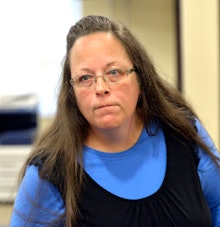The Side of the Kentucky Clerk Kim Davis' Same-Sex Marriage Fight No One Is Talking About

Since the Supreme Court made same-sex marriage legal in June, Kim Davis, a county clerk in Kentucky, has repeatedly refused to issue marriage licenses to same-sex couples.
She famously appears in this video:
People are outraged. The American Civil Liberties Union filed a lawsuit against Davis earlier this summer. Many have demanded that Davis be removed from her position. The ACLU called for the clerk to be held in contempt of court. And throughout all of this, Davis has continued to deny same-sex couples marriage licenses, and is currently in police custody for doing so.
Davis's acts are wrong, but represent the tip of the iceberg. Marriage is just one of many rights that individuals can be denied on the basis of their personal beliefs. Davis is one of many and institutions people denying these rights.
The resistance is rooted in the Religious Freedom Restoration Act, which permits exemptions from federal laws to people who believe they "substantially burden" their religious practice. Though the RFRA was passed in 1993, it's been increasingly invoked. Nineteen states passed laws modeled on the RFRA over the past two decades, and similar bills were introduced in at least 15 states this past year alone.
In fact, one of the most notable instances of this exemption came into play during last summer's Burwell v. Hobby Lobby ruling, in which the Supreme Court effectively interpreted the RFRA to allow business owners to deny employees certain benefits — in this case, birth control coverage — based on their beliefs.
What are the limits? MSNBC reporter Irin Carmon found the "national fury" surrounding Davis interesting, she tweeted Wednesday night, given that "there are so many pharmacists who legally refuse prescriptions to women."
Carmon is right. Women's basic health and reproductive rights have been at the discretion of pharmacists for years. In fact, pharmacists in at least 25 states have denied women contraception or emergency contraception on religious or conscientious grounds, according to the National Women's Law Center. Six states legally protect pharmacists' decisions about whether to personally provide contraceptives or emergency contraception to women, and six others have "refusal clauses" that would effectively protect pharmacists' choice to do so.
The conservative backlash. Davis is not just one aggrieved individual. She is part of a rising tide of those who feel their religious freedom is at stake.
Most people now side with same-sex marriage and reproductive rights. The need to protect "traditional morality" is increasingly hollow. Instead, this "religious burden" argument has become more and more prevalent, a popular tactic used to combat people from maintaining these rights. While Davis may earn widespread attention, her story is may be a harbinger of pushback to come.